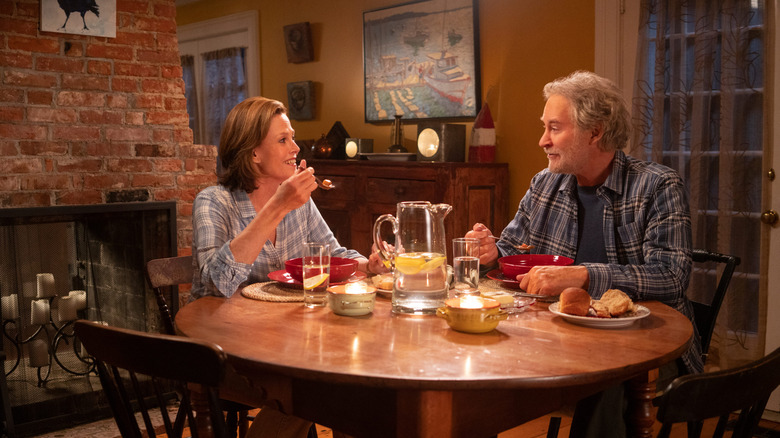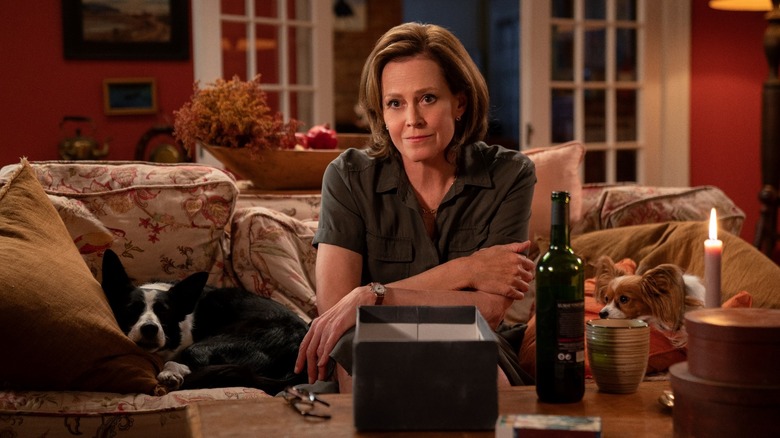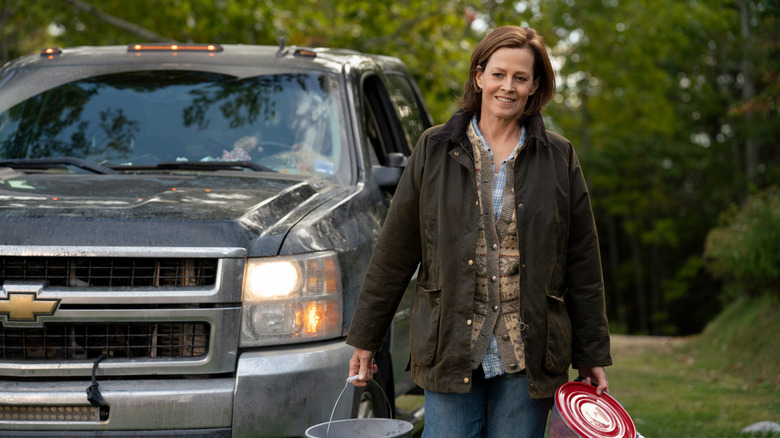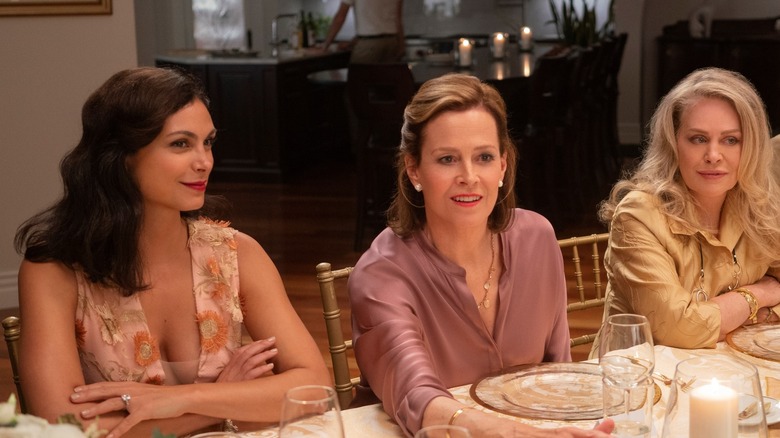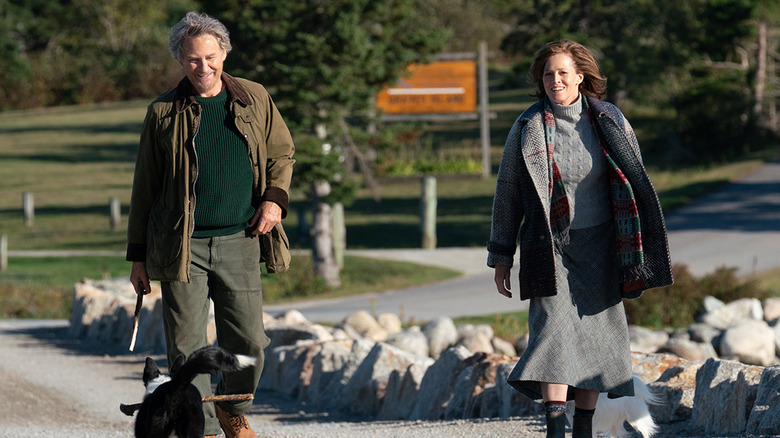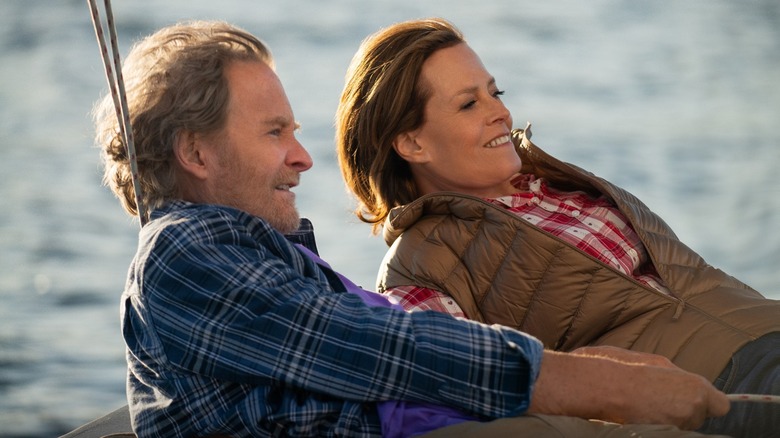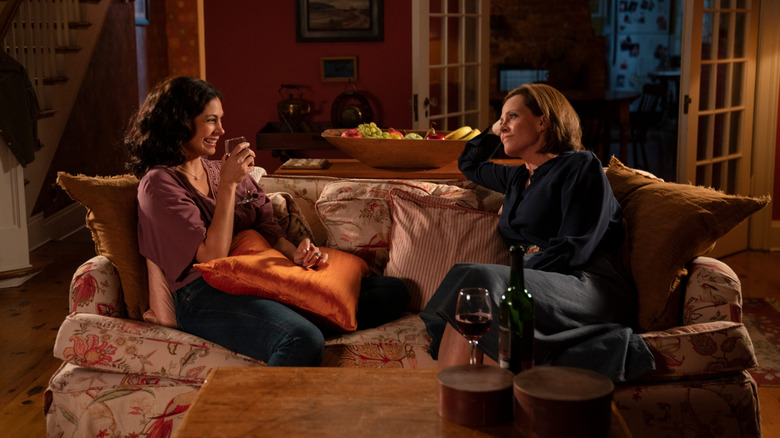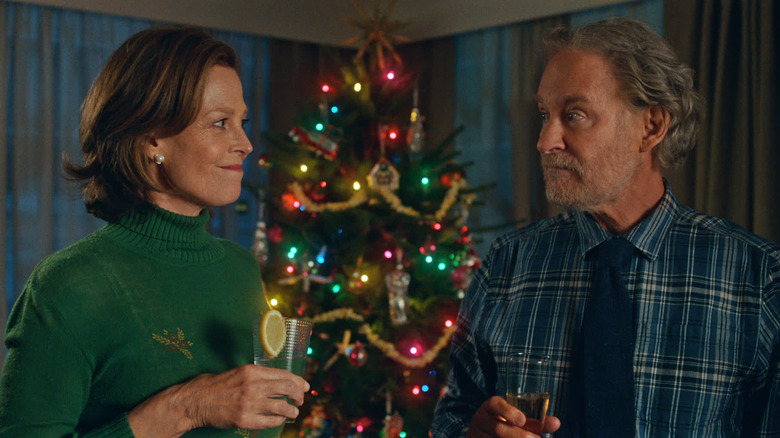The Good House Directors Talk About Crafting Their Romantic New England Dramedy [Exclusive Interview]
Life doesn't always go the way we planned, and the stories we tell ourselves aren't always true. In "The Good House," New England real estate agent Hildy Good, played by Sigourney Weaver, seems to have it all. She has the gorgeous house, the successful real estate business, and a potential romance with her high school flame, local construction contractor Frank (played by Kevin Kline). The only problem is that she's an alcoholic, and despite going through rehab for her daughter and convincing everyone that she's stayed sober, she hasn't. One glass of wine after dinner turns into one bottle, and before long, Hildy faces losing everything. "The Good House" is a funny, heartfelt drama with a killer cast, based on the novel of the same name by Ann Leary.
I had the chance to sit down via Zoom with "The Good House" directors Maya Forbes ("The Polka King") and Wally Wolodarsky ("Seeing Other People") and talk about this genre-bending film about life and love after 60, working with cinematic titans like Weaver and Kline, and the challenges of addiction stories. They shared their cinematic inspirations and their favorite song on the soundtrack, delving into the fun behind-the-scenes details on "The Good House."
'This camera is your friend'
The frequent fourth-wall breaks are really interesting. What inspired you to make that narrative choice?
Forbes: Well, we were inspired because the book has a ... it's based on a book, and the narrator, Hildy, really brings you into her point of view and makes you her confidant. And she's not reliable, but she's trying to convince you and herself that she doesn't have a problem. When we got involved, Sigourney was already involved. And it just felt like having someone we know so well, Sigourney Weaver, we've loved watching her for years and years, trying to convince us that she's totally fine. And bringing us onto her side would be a fun and more dynamic way to explore the idea of denial and the stories we tell ourselves to get through the day that maybe are not that — as we watch, we're starting to realize maybe those stories aren't accurate after all. So it just felt like a kind of fun way.
Wolodarsky: Yeah. I mean, I would say that it's a movie about drinking, of course. And when you go to the bar, sometimes somebody tries to hook you in and convince you of something. And that really was on our mind as we were making the movie. Just like we always were talking to Sigourney about, "This camera is your friend. You're trying to convince them that you know what's what, and it's really okay."
Forbes: That was cute because she was like, "Where's my friend? I want to tell my friend. I need to explain to my friend just about what just happened."
'One of those things that they're going to share are these songs'
The soundtrack is just great. There's a lot of early classic rock. Did you know which songs you wanted from the start, or is that something that sort of happened organically as the movie was in production?
Wolodarsky: A little bit of both. I mean, we're music lovers, too. We've worked with the same music supervisors forever, Randy Poster and Meghan Currier, and we really love them, too. So we have our ideas, they have their ideas. But we always knew it was going to be rooted in the past because these are two people who never moved out of their town and have a long history together. And one of those things that they're going to share are these songs.
Forbes: Classic rock. I think that the final song, the Joan Armatrading ["Down To Zero"] is just something I've always ... a song I've loved and wanted to use forever. Wouldn't you say?
Wolodarsky: Yes, definitely. And it also fits the era, and it just all works together.
'Don't you want to live here?'
That sort of leads me into my next question, which is the setting. This New England setting feels so lived in, but it's also so cinematic. All of the outdoor shots are gorgeous, and then the insides of the houses are all neatly manicured and just beautiful. What inspired that sort of lush visual aesthetic?
Wolodarsky: Well, that was very important to us, because you want to sell part of ... Hildy's sales pitch is, "Everything's perfect, everything's wonderful."
Forbes: [Mimicking Hildy] "Don't you want to live here?"
Wolodarsky: And then to show, "Well, actually there are some cracks here that are emerging" as we get deeper into the movie. But certainly for the beginning of the movie, that was very ... we really wanted that to be the tone, a little bit of a bait-and-switch Nancy Myers world. Something a little bit different is happening.
Forbes: Maybe it's not all so perfect after all. Because I think those little towns, they are so beautiful. I'm from New England, grew up in new England. So to me it's like, "Oh, I love it." But I also know that it can feel kind of stifling and claustrophobic when you're really there. And there's a lot of things going on behind the closed doors that people don't necessarily want you to know about or see. So it played into, similarly, the whole story about how you present your appearance, and then there's what's really going on.
'You're always trying to communicate a feeling via the landscape'
And it is very a New England story, so it doesn't surprise me to hear that you're from New England. What did you do to make the film feel both distinctly "New England" and also universal?
Forbes: Well, we definitely cast — we've shot a couple of films in New England. So we worked with a bunch of actors from New England, other than Sigourney and Kevin. What else did we do to make it feel –
Wolodarsky: Well, I mean, we're just looking for — you're always trying to communicate a feeling via the landscape. That's always important to us. But in terms of its universality, these are just people that feel very familiar to me. I grew up on Long Island. That's not really the same thing, but it's the same sort of claustrophobia of a small town. And I think that's where the themes are universal. And so what makes it interesting to us is to try and capture a specific spirit while still getting into these deeper, bigger issues.
Forbes: And the locality of it did help. I mean, the specificity of it, I think.
Wolodarsky: Yeah, that's always important to us. Yes.
'Her journey is about her'
There really aren't a lot of romantic dramedies with older leads. It felt really refreshing to have these flirtations and this romance evolve between Weaver and Kline. Were there any considerations you had to take, or was it just filming a rom-com about young people, just with more seasoned performers?
Wolodarsky: Yeah. I mean, I don't think we ever once had a conversation about, "Oh, these are older people." These are two people looking for love. And does it change with age? No. I mean, maybe it changes in some ways, but it seemed very familiar to us and to them. They were very game.
Forbes: I guess in a way, you do get the sense with these two characters that something has been preventing them from ... there's an empathy with it, because it feels like they're both creeping towards each other tentatively. They've been in each other's orbit, but they haven't been able to make this move. I mean, she was married, they'd had a relationship before and that was probably hurtful. She went off and married someone else. So I feel like there's a sweetness to it, because it's like finally, they're finally taking that risky step. So in that way it's a little bit different.
Wolodarsky: But then again, I think we could write a scene like that, and they could be 17.
Forbes: Sure. That's true.
Wolodarsky: So I hear what you're saying, but it's like, I can certainly remember the halting feeling you had about, "Does this person like me? Can I make that move?"
Forbes: I mean, I think what was interesting to us is that there is this romantic comedy element, but because she's a woman in her 60s and it's about her, it's more than that. You know what I mean? It's not just that. And the main part of the story isn't like, "I'm going to find this man, and he's going to save me." She really has to come to terms with herself. Her journey is about her. And only when she deals with herself can she be open to this relationship. So I think that was really interesting to us, that it was about a woman's whole ... all the elements of her life, her work, her family, her romance, looking for love, all of it. We like that.
'We feel like we fit in a continuum of movies that exist, but just have disappeared'
That leads into my next question. The movie plays with genre a little bit, because it's a rom-com, it's an addiction drama, it's possibly supernatural. How did you figure out how to balance those elements without ever leaning too hard into one or the other?
Wolodarsky: Well, I think that comes from the movies that we grew up with. So we referenced "Terms of Endearment," "Kramer vs. Kramer." And there's a host of other movies that were — "Ordinary People." You forget, there were many funny things that floated through "Ordinary People." And it wasn't a conversation back then about, "The tone is so different." But because that movie has disappeared, it feels a little bit different again, which is fine. It's fine. That's fine for us. But we feel like we fit in a continuum of movies that exist, but just have disappeared.
Forbes: We felt like, "Does it exist in life? Are these elements of a person's life?" Yes. Wally, we have a disagreement about supernatural things, but I'm more open to ... let's just say, I'm more open to them and Wally is less, but –
Wolodarsky: Or not at all.
Forbes: Yes. Zero. Wally is zero, and I'm ... mystery. I don't know. I sort of feel like one thing that has happened in movies is that story has been boiled down to a formula. It's almost like, "If people could develop a story formula that then could be delivered to a computer and a computer could do it, wouldn't that be great?" But the great thing is ... I mean, I do think if stories conform to a certain formula, they get boring, because you know exactly where they're going, and you know what's going to happen. And so we wanted to just not adhere to a formula or a specific thing, because then there's maybe some surprise along the way.
'Let's just be open and game and ready for what comes'
Speaking of surprises, how did you keep everyone on set from cracking up when Sigourney said, "Jazz cabbage?"
Forbes: People did laugh. That was ridiculous.
What was it like working with absolute titans like Kevin Kline and Sigourney Weaver?
Forbes: I can't believe it still.
Wolodarsky: Yeah, it was really exciting, of course. We're huge fans of both of them. The thing that was so revelatory was here are people who are so deep into their careers, and yet they remain so playful and flexible and full of ideas.
Forbes: And game.
Wolodarsky: So that was really thrilling. It was an amazing model for, "Oh, what a great way to proceed in with life. Let's just be open and game and ready for what comes."
"The Good House" premieres in theaters nationwide on September 30, 2022.
